As a cat lover and experienced veterinarian, I understand how important it is to care for our furry friends, especially when they are just beginning their journey in life. Newborn kittens are vulnerable and can sometimes experience constipation, which can be a cause of concern for their well-being. In this article, I will provide you with essential tips and guidance on how to effectively remedy constipation in newborn kittens, ensuring their comfort and health.
Key Takeaways:
- Constipation can occur in kittens of any age and is defined as difficulty defecating or a lack of any feces being produced.
- Symptoms of kitten constipation include straining to defecate, producing small, hard fecal balls, decreased appetite, and restlessness.
- Possible causes of kitten constipation include dehydration, lack of fiber in the diet, intestinal worms, and neurologic conditions affecting bowel movements.
- Veterinarians diagnose kitten constipation through physical examinations, X-rays, ultrasounds, and stool sample analysis.
- Treatment options for kitten constipation range from dietary changes and hydration to deworming medications and surgical intervention in severe cases.
What Is Kitten Constipation?
Kittens, just like adult cats, can experience constipation, which is defined as difficulty defecating. It can be uncomfortable for the kitten and may lead to potential health issues if left untreated. Constipation can occur in kittens of any age and is characterized by the absence or infrequency of bowel movements. Obstipation, a severe form of constipation, is when no feces are produced. There are several factors that can contribute to kitten constipation, including dehydration, lack of fiber in the diet, obstruction from ingested objects, intestinal worms, lack of activity, or neurologic conditions affecting bowel movements.
To better understand kitten constipation, it is important to identify the symptoms. A constipated kitten may show signs such as straining to defecate, producing small, hard fecal balls, blood or mucus in the stool, crying in the litter box, decreased appetite, a bloated appearance, restlessness, vomiting, lethargy, and weakness. If you notice any of these symptoms in your kitten, it is crucial to provide relief and seek veterinary assistance if necessary.
When it comes to providing relief for constipated kittens, there are various remedies and treatments available. From dietary changes to hydration and medications, the goal is to improve bowel movements and relieve discomfort. Home remedies such as providing water, canned kitten food, gentle belly massage, and warm water baths can also help in mild cases. It is important to note that severe cases of constipation may require deobstipation or surgical intervention, which should always be performed by a veterinarian.
Table: Causes of Kitten Constipation
| Causes | Description |
|---|---|
| Dehydration | Lack of water intake leading to dry and hard stools. |
| Lack of Fiber in the Diet | A diet low in fiber can result in poor bowel movements. |
| Obstruction from Ingested Objects | Ingesting foreign objects can block the digestive system. |
| Intestinal Worms | Parasites residing in the intestines can cause constipation. |
| Lack of Activity | Insufficient physical activity can affect bowel movements. |
| Neurologic Conditions | Conditions affecting the nervous system can impact bowel movements. |
By understanding the causes, symptoms, and treatment options for kitten constipation, you can provide the necessary care and support to ensure your kitten’s well-being. Regular monitoring and maintaining a healthy diet are essential in preventing constipation in kittens. Remember to consult with a veterinarian for a proper diagnosis and guidance tailored to your kitten’s specific needs.
Symptoms of Kitten Constipation
If you suspect that a newborn kitten is constipated, it’s important to look out for specific symptoms. These signs can help you determine whether the kitten needs assistance to relieve their constipation. Some common symptoms include:
- Not producing any feces in 24-48 hours
- Straining to defecate
- Producing small, hard fecal balls
- Presence of blood or mucus in the stool
- Crying or discomfort in the litter box
- Decreased appetite
- Bloated appearance
- Restlessness
- Vomiting
- Lethargy and weakness
These symptoms may vary in intensity, and it’s essential to monitor the kitten’s behavior and bowel movements closely. If you notice any of these signs, it is advisable to seek veterinary guidance for proper diagnosis and treatment.
Other Possible Symptoms
In addition to the common symptoms listed above, constipation in kittens can also manifest as:
- Weight loss
- Bad breath
- Unkempt coat
- Abdominal discomfort
- Inability to urinate properly
If you observe any of these symptoms in a newborn kitten, it is crucial to consult a veterinarian promptly to ensure the well-being and health of the kitten.
Table: Symptoms of Kitten Constipation
| Symptom | Explanation |
|---|---|
| No feces produced in 24-48 hours | Kitten has not passed any stool within the usual timeframe. |
| Straining to defecate | Kitten appears to have difficulty or discomfort while trying to pass stool. |
| Producing small, hard fecal balls | Stool is dry, compacted, and difficult to pass. |
| Blood or mucus in the stool | Presence of blood or mucus indicates potential irritation or inflammation in the digestive tract. |
| Crying or discomfort in the litter box | Kitten shows signs of pain, distress, or vocalization while attempting to defecate. |
| Decreased appetite | Kitten shows a reduced interest in food or refuses to eat altogether. |
| Bloated appearance | Abdomen appears swollen or distended. |
| Restlessness | Kitten is continuously moving or struggling to find a comfortable position. |
| Vomiting | Kitten experiences recurrent episodes of regurgitation. |
| Lethargy and weakness | Kitten exhibits a general lack of energy and appears weak. |
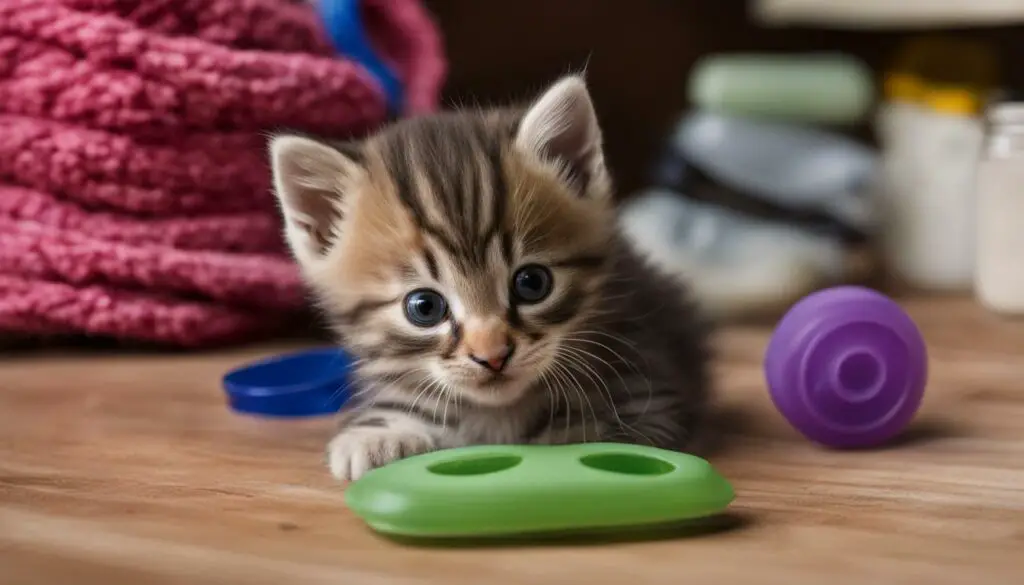
Causes of Kitten Constipation
In order to effectively relieve constipation in newborn kittens, it is important to understand the underlying causes. There are several factors that can contribute to constipation in kittens, including:
- Inability to defecate on their own at a very young age: Newborn kittens rely on their mother to stimulate bowel movements. If this process is disrupted or if the kitten is orphaned, constipation can occur.
- Dehydration: Lack of proper hydration can lead to hard, dry stools that are difficult to pass.
- Lack of fiber in the diet: A diet lacking in sufficient fiber can result in sluggish bowel movements and constipation.
- Gastrointestinal obstruction from ingested objects: Kittens are curious and may ingest foreign objects that can block the intestinal tract and impede bowel movements.
- Intestinal worms: Parasitic infestations can cause inflammation and obstruction in the intestines, leading to constipation.
- Lack of activity or excessive weight gain: Sedentary behavior or excessive weight can contribute to sluggish bowel movements and constipation.
- Neurologic conditions affecting bowel movements: Certain neurological conditions can disrupt the normal muscle contractions in the intestines, leading to constipation.
Identifying the specific cause of constipation in a kitten is crucial for determining the most appropriate treatment and providing relief.

How Veterinarians Diagnose Kitten Constipation
When it comes to diagnosing kitten constipation, veterinarians employ a combination of physical examination, imaging techniques, and laboratory tests to accurately assess the severity of the condition and identify any underlying causes. If a kitten has not produced stool in 24-48 hours, it is crucial to seek veterinary attention promptly to prevent complications.
Physical Examination
During the physical examination, the veterinarian will carefully palpate the kitten’s abdomen to assess for any abnormalities or signs of discomfort. They will also evaluate the overall health of the kitten and check for any other concurrent conditions that may be contributing to the constipation.
Imaging Techniques
In some cases, X-rays or ultrasounds may be necessary to visualize the severity of the constipation and determine if there is the presence of megacolon—a condition characterized by a dilated and ineffective colon. These imaging techniques allow veterinarians to assess the extent of the obstruction and guide treatment decisions accordingly.
Laboratory Tests
Stool samples may be requested to analyze for any underlying infections, parasites, or other abnormalities that may be contributing to the constipation. These tests can provide valuable information about the overall gastrointestinal health of the kitten and help guide treatment strategies.
| Diagnostic Method | Purpose |
|---|---|
| Physical Examination | To assess abdominal abnormalities and overall health |
| Imaging Techniques (X-rays, Ultrasounds) | To visualize severity of constipation and identify presence of megacolon |
| Laboratory Tests (Stool Samples) | To analyze for infections, parasites, and other abnormalities |
By utilizing these diagnostic methods, veterinarians can accurately diagnose kitten constipation and tailor an effective treatment plan to alleviate the condition and prevent future episodes. It is crucial for pet owners to seek professional veterinary care and follow their recommendations to ensure the well-being of their constipated kittens.
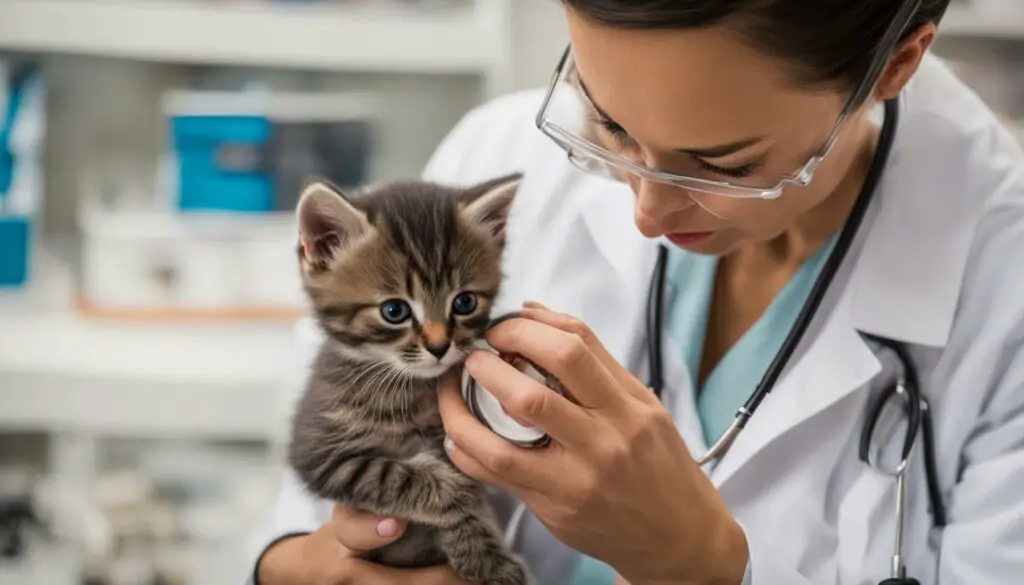
Treatment of Kitten Constipation
When it comes to treating constipation in newborn kittens, a multifaceted approach is often necessary to provide relief and promote regular bowel movements. The treatment plan will depend on the severity of the constipation and underlying causes. Here are some safe constipation remedies for newborn kittens:
Dietary Changes:
Adjusting the kitten’s diet can help alleviate constipation. If the kitten is on a dry food diet, switching to a moist or canned kitten food can increase hydration and fiber intake, making it easier to pass stools. It’s important to consult with a veterinarian for specific dietary recommendations tailored to the kitten’s needs.
Hydration:
Ensuring that the kitten is well-hydrated is crucial in softening stools and preventing constipation. Offer fresh water at all times and consider providing a shallow dish of warm water for the kitten to dip their paws in, as some kittens may prefer to lick water off their paws.
Stimulation and Massage:
In mild cases of constipation, gently massaging the kitten’s abdomen or stimulating the anus with a cotton ball soaked in warm water can help trigger bowel movements. This should be done with care and under the guidance of a veterinarian to avoid causing any discomfort or harm to the kitten.
| Treatment Method | Description |
|---|---|
| Dietary Changes | Adjusting the kitten’s diet to include moist or canned kitten food |
| Hydration | Ensuring the kitten has access to fresh water and offering warm water for paw dipping |
| Stimulation and Massage | Gently massaging the kitten’s abdomen or stimulating the anus with a warm cotton ball |
In cases where the constipation persists or if the kitten is experiencing severe constipation, it is important to seek veterinary care. The veterinarian may recommend additional treatments such as fiber supplements, laxatives, enemas, or prescribed medications to help alleviate the constipation. These interventions should only be administered under professional guidance to ensure the kitten’s safety and well-being.
With the right combination of treatments and care, newborn kittens can find relief from constipation and enjoy healthy bowel movements. It is important to monitor the kitten’s progress and consult with a veterinarian if there are any concerns or persistent issues. By providing gentle, safe remedies and proactive management, constipation in newborn kittens can be effectively eased.

Gentle Remedies for Constipated Newborn Kittens
If you suspect that your newborn kitten is constipated, there are a few gentle remedies you can try at home before seeking veterinary assistance. These remedies can help stimulate bowel movements and provide relief for your little furball.
1. Stimulation Technique
For very young kittens who are not yet able to defecate on their own, you can use a soft cotton material, like a warm and moist towel, to gently massage their anal area. This stimulation technique mimics the mother cat’s licking and can help trigger bowel movements in the kitten.
2. Hydration and Moist Food
Ensuring that your constipated kitten is well-hydrated is important in softening the stool. You can provide water in a shallow bowl or use a pet-specific electrolyte solution to encourage drinking. Additionally, feeding moist kitten food, which is high in moisture content, can also help soften the stool and ease constipation.
3. Encouraging Movement
Physical activity can stimulate intestinal motility and help alleviate constipation. Create a safe and kitten-proofed space where your furry friend can play and explore. Encourage gentle playtime to promote movement and exercise, which can aid in relieving constipation.
Remember, while these gentle remedies may help in mild cases of constipation, it is essential to monitor your kitten’s condition closely. If the constipation persists or worsens, or if your kitten shows any other concerning symptoms, it is crucial to consult a veterinarian for proper diagnosis and treatment.

Recovery and Management of Kitten Constipation
Once the constipation is resolved, recovery is typically quick. However, it is important to identify and address the underlying cause to prevent future episodes. Following the veterinarian’s instructions, finishing prescribed medications, providing a balanced diet, routine deworming, and maintaining good hygiene are essential for managing and preventing constipation in kittens.
To ensure a smooth recovery, it is crucial to closely monitor the kitten’s bowel movements and overall health. Keeping a record of their stool consistency, frequency, and any signs of discomfort can help identify any potential issues early on. Regular check-ups with the veterinarian will also aid in evaluating the progress of the recovery and making any necessary adjustments to the treatment plan.
In addition to medical interventions, simple changes in the kitten’s lifestyle can contribute to long-term management of constipation. Providing a high-quality diet that includes enough fiber can promote healthy digestion and prevent future episodes. Ensuring access to clean water at all times is also crucial for hydration, which is essential for normal bowel movements.
Regular exercise and playtime can help stimulate the kitten’s digestive system and promote regular bowel movements. Encouraging physical activity by providing toys and engaging in interactive playtime will not only support their overall well-being but also aid in preventing constipation.
| Recovery and Management of Kitten Constipation | Safe Constipation Remedies for Newborn Kittens |
|---|---|
| Follow veterinarian’s instructions | Provide a balanced diet |
| Finish prescribed medications | Routine deworming |
| Monitor bowel movements and health | Maintain good hygiene |
| Ensure high-quality diet with enough fiber | Encourage exercise and playtime |
| Keep access to clean water at all times |

“Proper management and prevention of constipation in kittens require a holistic approach that combines veterinary guidance, lifestyle adjustments, and attentive care. By following the recommended treatment plan, providing adequate nutrition and hydration, and ensuring regular exercise, kitten constipation can be effectively managed and future episodes prevented.”
Found a Litter of Kittens Outside?
If you come across a litter of kittens outside, it’s essential to assess the situation before taking any action. The first step is to observe the kittens and determine if they appear warm, well-cared for, and if the mother cat is nearby. If the kittens seem to be in good health and the mother is present, it’s best to leave them be. The mother cat is the best caretaker for her kittens and will provide them with the necessary care, including feeding and stimulation for elimination.
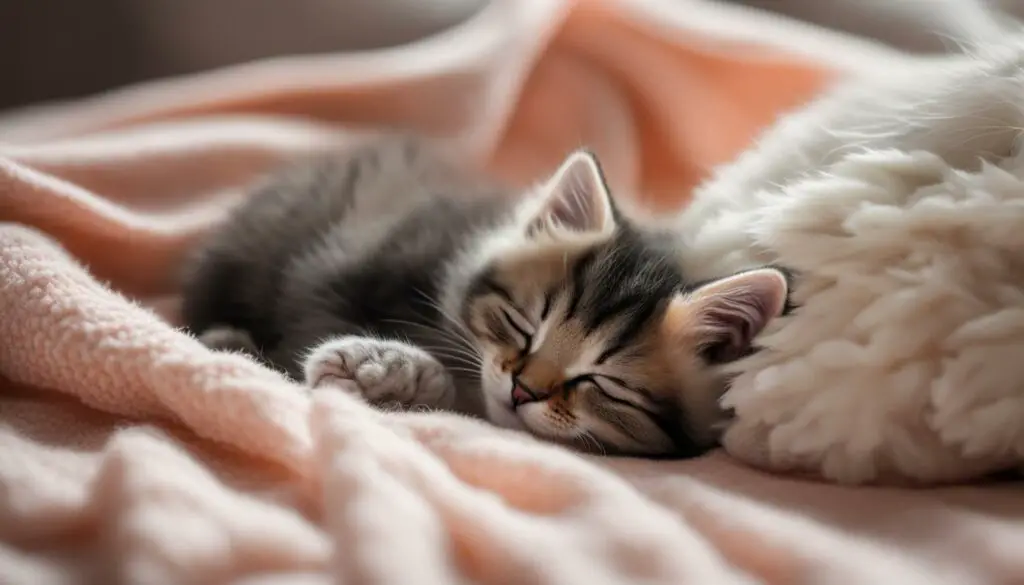
However, if the kittens are cold, sick, or in distress with no sign of the mother, it is important to bring them indoors and provide them with proper care. Start by placing them in a warm, quiet area away from drafts. You can use a heating pad set on low or a warm water bottle wrapped in a towel to provide warmth. It’s crucial to ensure the kittens are not overheated, so make sure to monitor the temperature closely.
Feeding is another important aspect of caring for orphaned kittens. They will require a special milk replacement formula designed for kittens, as cow’s milk can cause digestive upset. You can find kitten milk replacement formulas at pet stores or consult with a veterinarian for recommendations. Feeding should be done every 2-3 hours using a small bottle or syringe. It’s important to never force-feed the kittens and allow them to eat at their own pace.
Stimulation for elimination is crucial for newborn kittens, as they are not able to do so on their own. After each feeding, you will need to gently stimulate their genital area with a soft cloth or cotton ball moistened with warm water. This mimics the mother cat’s grooming behavior and encourages urination and defecation.
Raising an Orphaned Kitten
When it comes to raising an orphaned kitten, there are several important considerations to keep in mind. These vulnerable creatures require special care and attention to ensure their well-being and healthy development. From providing a suitable environment to establishing a proper feeding regimen, here are some essential tips for raising an orphaned kitten.
Proper Environment
Creating a suitable environment for the orphaned kitten is crucial. Ensure that the space is warm, quiet, and free from any potential hazards. Provide a comfortable bed, such as a soft blanket or a heating pad set to a low temperature to mimic the warmth of the mother cat. This will help keep the kitten cozy and secure.
Feeding Regimen
Establishing a proper feeding regimen is essential for the growth and development of the orphaned kitten. If the kitten is too young to feed on its own, you will need to bottle-feed it with a specially designed kitten formula. Follow the instructions on the formula packaging and consult with a veterinarian for guidance on the proper feeding schedule and technique.
| Age of Kitten | Feeding Frequency | Amount per Feeding |
|---|---|---|
| 0-2 weeks | Every 2 hours | 5-10 mL |
| 2-4 weeks | Every 3-4 hours | 10-20 mL |
| 4-6 weeks | Every 4-6 hours | 20-30 mL |
Urination and Defecation
Unlike adult cats, orphaned kittens require stimulation to urinate and defecate. After each feeding, gently massage the kitten’s genital area with a warm, damp cotton ball or soft cloth. This will simulate the mother cat’s tongue and help trigger the elimination reflex. Be patient and gentle during this process to avoid causing any discomfort or injury.
Raising an orphaned kitten can be a rewarding experience, but it also requires dedication and knowledge. By providing a suitable environment, establishing a proper feeding regimen, and ensuring proper elimination, you can help the kitten thrive and grow into a healthy adult cat.
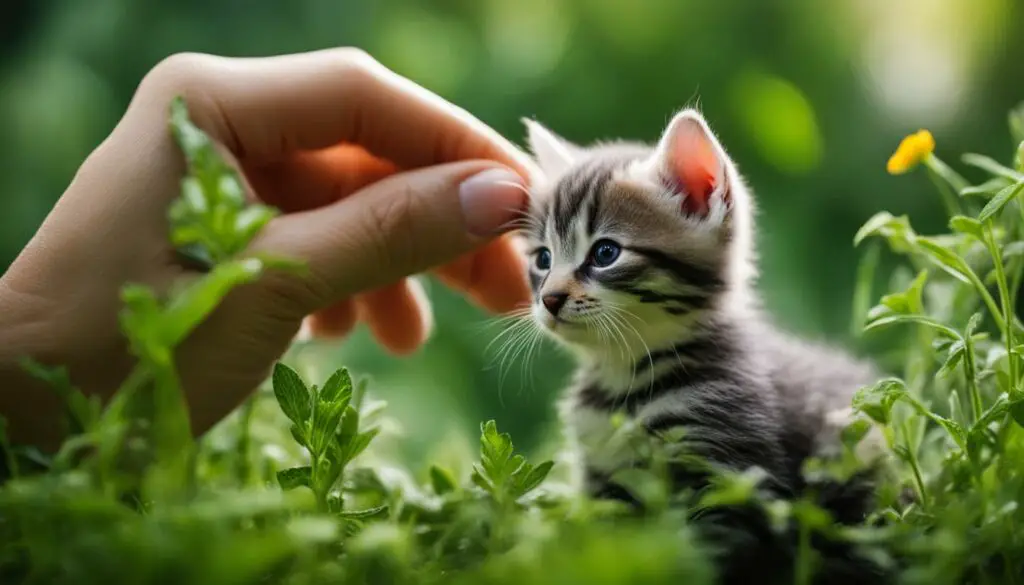
Should any kittens not be hand-reared?
While hand-rearing kittens can be a rewarding experience, there are certain cases where it may not be the best option. It is important to carefully assess the condition of the kittens and consult with a veterinarian to make an informed decision. In some situations, hand-rearing may not be suitable for kittens with severe defects or health issues that require specialized medical care.
H3: Factors to Consider
When determining whether to hand-rear a kitten, several factors need to be taken into consideration. These include the overall health of the kitten, the presence of any congenital abnormalities or chronic illnesses, and the availability of resources and expertise needed to provide the necessary care. If the kitten’s health condition is too severe or requires extensive medical interventions, it may be more humane to consider other options.
Alternatives to Hand-rearing
In cases where hand-rearing is not recommended, there are alternative options to ensure the kittens receive the care they need. Foster programs, where experienced caregivers provide temporary care for kittens, can be an excellent solution. These programs ensure that the kittens receive specialized care while offering them the opportunity to socialize and develop normally in a home environment.
In addition, animal shelters and rescue organizations often have resources and expertise to care for kittens with special needs. They can provide medical treatment, rehabilitation, and ultimately find suitable forever homes for these kittens. It is crucial to reach out to these organizations to explore alternative options for the well-being of the kittens.
In Conclusion
Hand-rearing kittens requires a significant commitment of time, resources, and expertise. While it can be a fulfilling experience for some, it is important to consider the best interests of the kittens and their overall health. Consulting with a veterinarian and exploring alternative options can help ensure that kittens with severe defects or health issues receive the specialized care they need to thrive.
Do hand-reared kittens develop normally?
Hand-rearing kittens can be a rewarding but challenging experience. While it is essential to provide care and nourishment to orphaned kittens, it’s also important to consider their long-term development and well-being. Kittens that are hand-reared without any interaction with other cats may be at a higher risk of developing psychological abnormalities. However, if hand-reared kittens have exposure to other cats and can learn from them, they may have a better chance of developing normally.
Interacting with other cats allows kittens to learn social skills, communication, and appropriate behaviors. It helps them understand their feline instincts and develop a sense of belonging within their species. By observing and playing with other cats, hand-reared kittens can learn important lessons that contribute to their overall development.
It’s important to note that each kitten’s development may vary based on various factors, including their individual temperament and the quality of care they receive. Providing a stimulating environment with plenty of toys, climbing structures, and opportunities for socialization can greatly enhance their overall growth and development.
The Role of Socialization and Enrichment
Socialization plays a crucial role in a kitten’s development. Through interactions with other cats, kittens learn important cues about appropriate play, grooming, and social boundaries. It not only helps them form positive relationships but also builds their self-confidence and reduces anxiety.
Enrichment activities like puzzle feeders, interactive toys, and playtime can also contribute to a kitten’s mental and physical well-being. These activities simulate natural hunting behaviors, keeping them engaged and preventing boredom. Additionally, providing a safe outdoor space or access to a window with a view can further enrich their environment.
| Benefits of Socialization and Enrichment for Hand-Reared Kittens |
|---|
| 1. Development of social skills and appropriate behaviors |
| 2. Increased self-confidence and reduced anxiety |
| 3. Prevention of boredom and stimulation of natural instincts |
| 4. Enhanced mental and physical well-being |
| 5. Formation of positive relationships with humans and other cats |
While hand-reared kittens may face some unique challenges, with the right care and opportunities for socialization and enrichment, they have the potential to develop into happy, healthy, and well-adjusted cats.
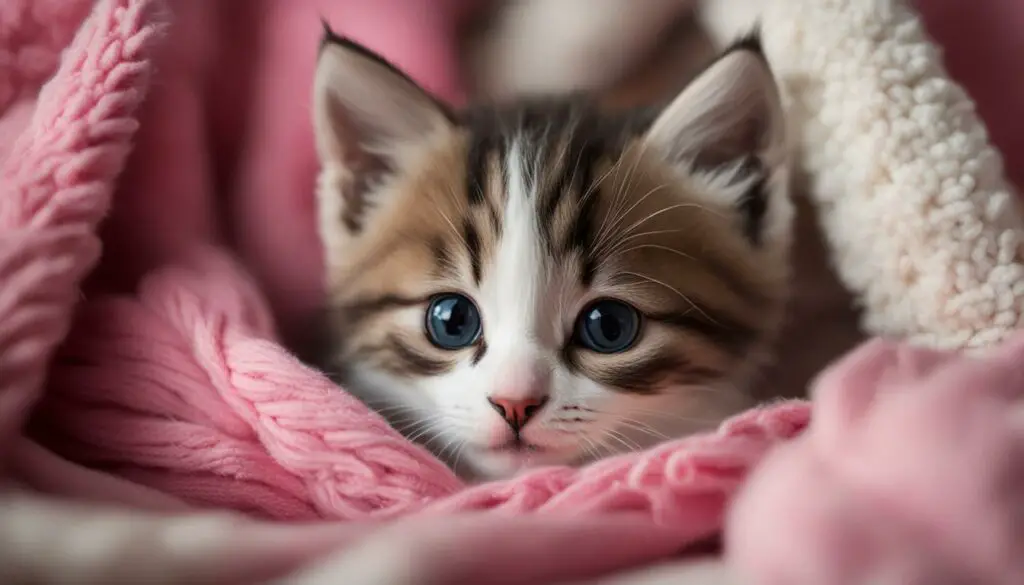
Basic considerations when hand-rearing kittens
When hand-rearing kittens, there are several important factors that need to be considered to ensure their well-being and healthy development. Providing a suitable environment, establishing a feeding regimen, ensuring proper urination and defecation, and maintaining general health are all crucial aspects of hand-rearing kittens.
One of the major challenges encountered when hand-rearing kittens is the risk of chilling, dehydration, and starvation. Kittens are highly susceptible to temperature changes and require a warm and draft-free environment. It is important to monitor their body temperature regularly and provide supplemental heat if necessary.
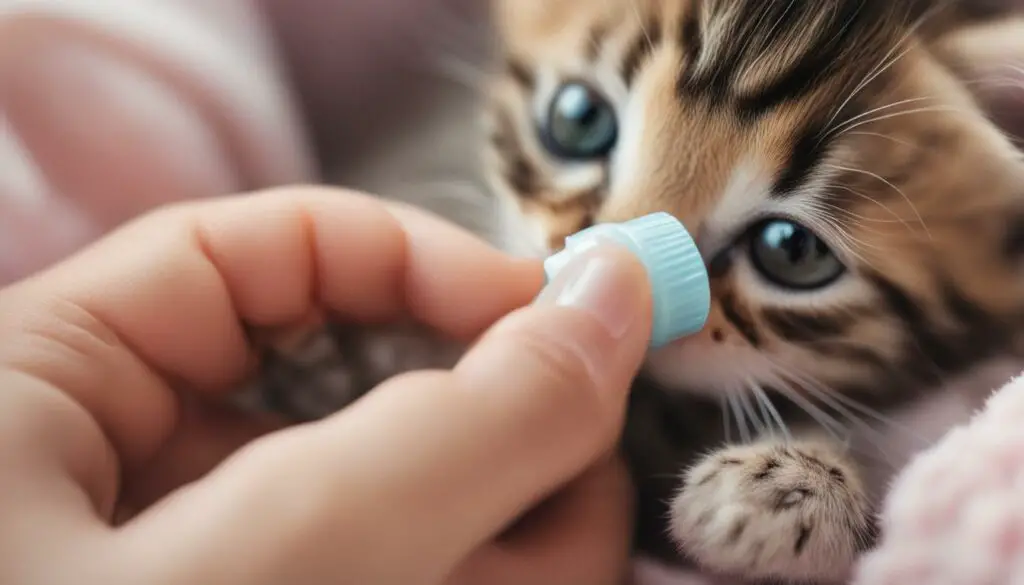
Feeding is another critical aspect of hand-rearing kittens. The mother’s milk provides essential nutrients and antibodies, so it is important to use a kitten milk replacer formula that closely mimics the composition of mother’s milk. Feeding should be done at regular intervals, and the kittens should be encouraged to suckle from a bottle or syringe.
| Considerations for Hand-rearing Kittens | Key Points |
|---|---|
| Environment | Provide a warm, draft-free environment for the kittens to prevent chilling. |
| Feeding | Use a kitten milk replacer formula and establish a regular feeding schedule. |
| Urination and Defecation | Stimulate the kittens to urinate and defecate after each feeding using a soft, damp cloth or cotton ball. |
| Healthcare | Monitor the kittens’ health closely and seek veterinary care as needed. |
Urination and defecation are essential bodily functions that kittens need assistance with during the early stages of life. After each feeding, gently stimulate the kitten’s genitals with a soft, damp cloth or cotton ball to encourage urination and defecation. This mimics the mother cat’s grooming behavior and helps initiate these natural bodily functions.
Last but not least, healthcare is crucial when hand-rearing kittens. Regular check-ups with a veterinarian, timely vaccinations, and deworming are critical to ensure the kittens’ health and well-being. Additionally, proper hygiene practices, such as keeping the living area clean and providing appropriate bedding, are essential to prevent the spread of diseases.
By considering these basic factors when hand-rearing kittens, you can provide them with the care they need to thrive and grow into healthy adult cats.
Conclusion
Constipation in newborn kittens can be a distressing issue, but there are effective remedies and relief measures available. By understanding the symptoms, causes, and treatments for kitten constipation, you can ensure the well-being and health of these vulnerable animals.
Providing a balanced diet, proper hydration, and regular veterinary check-ups are essential in managing and preventing constipation in kittens. Natural remedies, such as gentle belly massages and warm water baths, can also provide relief in mild cases.
It is important to remember that if you find a litter of kittens outside, assess the situation before taking any action. If the kittens appear warm and well-cared for, it may be best to leave them be. However, if they are cold, sick, or in distress, bring them indoors and provide the necessary care and stimulation for elimination.
Hand-rearing orphaned kittens requires special attention and consideration. While it can be a rewarding experience, it is important to be aware of the challenges and potential psychological abnormalities that may arise due to isolation. Consult with a veterinarian to determine the best course of action for kittens with severe defects or health issues.
In conclusion, with proper care, constipation in newborn kittens can be managed effectively. By adopting a holistic approach that considers nutrition, hydration, and overall health, you can provide relief and prevent future episodes of constipation.
FAQ
What is kitten constipation?
Kitten constipation is defined as difficulty defecating, and obstipation is a lack of any feces being produced. It can be caused by factors like dehydration, lack of fiber in the diet, obstruction from ingested objects, intestinal worms, lack of activity, or neurologic conditions.
What are the symptoms of kitten constipation?
Symptoms of kitten constipation can include no feces produced in 24-48 hours, straining to defecate, producing small, hard fecal balls, blood or mucus in the stool, crying in the litter box, decreased appetite, bloated appearance, restlessness, vomiting, lethargy, and weakness.
What are the causes of kitten constipation?
There are many potential causes of constipation in kittens, including the inability to defecate on their own at a very young age, dehydration, lack of fiber in the diet, gastrointestinal obstruction from ingested objects, intestinal worms, lack of activity or excessive weight gain, and neurologic conditions affecting bowel movements.
How do veterinarians diagnose kitten constipation?
If a kitten has not produced stool in 24-48 hours, a veterinarian will perform a physical examination, which may include palpating the abdomen. X-rays or ultrasounds may be needed to view the severity of the constipation and determine if megacolon is present. Stool samples may also be requested for analysis.
What is the treatment for kitten constipation?
The treatment for constipation in kittens varies based on the severity of the condition. It may include dietary changes, hydration, fiber supplements, deworming medications, laxatives, enemas, and in severe cases, deobstipation or surgical intervention. Home remedies such as providing water, canned kitten food, gentle belly massage, and warm water baths may also help in mild cases.
How can I provide a home remedy for kitten constipation?
While it is best to have a constipated kitten examined by a veterinarian, there are a few things that can be tried at home. For very young kittens, stimulation with a soft cotton material around the anus can help stimulate bowel movements. Ensuring hydration, feeding moist food, encouraging movement, and providing warmth can also aid in relieving constipation.
How long does it take for a kitten to recover from constipation?
Once the constipation is resolved, recovery is typically quick. However, it is important to identify and address the underlying cause to prevent future episodes. Following the veterinarian’s instructions, finishing prescribed medications, providing a balanced diet, routine deworming, and maintaining good hygiene are essential for managing and preventing constipation in kittens.
What should I do if I find a litter of kittens outside?
If the kittens appear warm, well-cared for, and the mother cat is likely nearby, it is best to leave them be. However, if the kittens are cold, sick, or in distress with no sign of the mother, they should be brought indoors and provided with proper care, including feeding and stimulation for elimination.
How do I raise an orphaned kitten?
Orphaned kittens require special care and attention. Factors like providing a suitable environment, feeding regimen, stimulating urination and defecation, and maintaining general health are crucial in raising hand-reared kittens. It is important to be aware of the potential challenges and considerations when hand-rearing kittens, including the risk of psychological abnormalities due to isolation.
Should all kittens be hand-reared?
In some cases, hand-rearing may not be the best option for kittens with severe defects or health issues. It is important to assess the condition of the kittens and consult with a veterinarian to determine the best course of action. Hand-rearing should only be undertaken when absolutely necessary and should be done with proper knowledge and resources.
Do hand-reared kittens develop normally?
Kittens that are hand-reared without any interaction with other cats may be at a higher risk of developing psychological abnormalities. However, if hand-reared kittens have exposure to other cats and can learn from them, they may have a better chance of developing normally. It is important to consider the long-term effects when deciding to hand-rear kittens.
What are the basic considerations when hand-rearing kittens?
When hand-rearing kittens, several important factors need to be considered, including providing a suitable environment, establishing a feeding regimen, ensuring proper urination and defecation, and maintaining general health. The major challenges encountered are chilling, dehydration, and starvation, which require close observation and prompt action.








